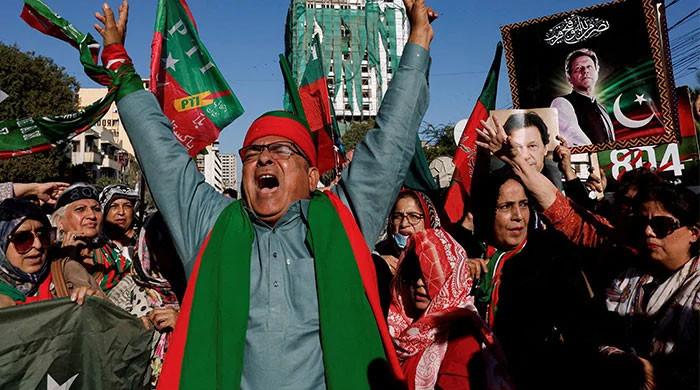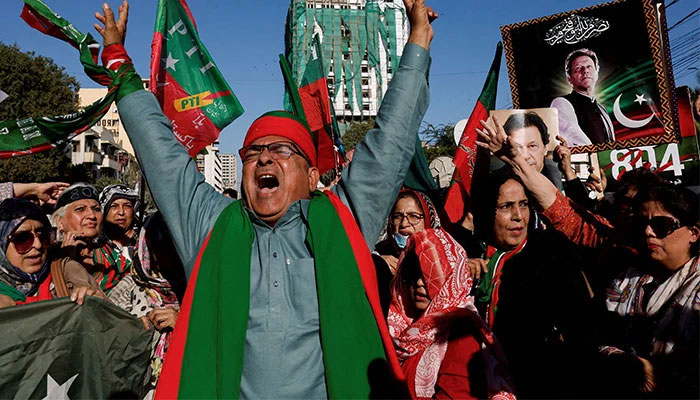NOC issued to PTI for Sept 8 power show amid ‘peaceful assembly’ bill passage
ISLAMABAD: The Senate on Thursday passed “Peaceful Assembly and Public Order Bill, 2024” — a legislation the Pakistan Tehreek-e-Insaf (PTI) believes aimed at halting its public gathering in Islamabad scheduled for September 8.
The district administration has granted no-objection certificate (NOC) to Imran Khan-founded party to hold jalsa on September 8 at Islamabad’s Paswal Sangjani.
According to an order issued today, the PTI will be bound to follow all rules and regulations while attendees coming from Khyber Pakhtunkhwa (KP) and Punjab will have to use motorway.
PTI’s top leadership has been facing criticism from party leaders and workers for not being able to hold the public gathering in Islamabad.
The former ruling party put off its Aug 22 “Islamabad Jalsa” and rescheduled it for September 8 after local administration revoked the no-objection certificate (NOC) and sealed roads leading to the federal capital, citing security concerns.
PTI leaders Gohar Ali Khan and Azam Swati claimed that the gathering was postponed on instructions of party founder Imran Khan after they met the incarcerated politician at 07:00am in Adiala Jail.
However, cracks appeared within PTI after several party leaders — including Imran’s sister Aleema Khan — contradicted the top leaders’ statements.
Expressing a lack of confidence in the current PTI leadership, Aleema claimed that the PTI leaders have no “real intention” of freeing the former prime minister from jail.
In a short audio clip, she also questioned why Swati paid a visit to Imran early in the morning and who instructed him to do so.
The government also lambasted “coward” PTI for postponing the political gathering with Defence Minister Khawaja Asif saying that they would never reschedule their power show if there was any chance of its success.
Meanwhile, the upper house of parliament bulldozed the ICT Public Order Bill — tabled by PML-N Senator Irfan Siddiqui — after its passage from Senate Committee on Interior.
Opposing the bill, PTI Senator Ali Zafar said that the purpose of bringing the new law was to once again cancel his party’s public gathering.
However, Irfan rejected the notion and said the federal capital was seemingly “under siege” and the growing number of processions has made the lives of citizens miserable.
The peaceful assembly bill was later passed by a majority vote.
Later, Opposition Leader in Senate Shibli Faraz castigated the treasury benches and said they were “misusing their authority”. “We have never laid siege the capital,” he said, adding that the government did not want the opposition to hold public gathering.
The bill
The bill bounds the event coordinator of an assembly to apply in writing to the district magistrate at least seven days before the intended date of the event.
Upon receipt of application, the district magistrate, before granting permission, would examine the prevailing law and order situation and obtain security clearance reports from the law-enforcement agencies.
The law also seeks to empower the government to designate a specific area of the Islamabad Capital Territory (ICT) as a red zone or high security zone, thereby prohibiting all types of assemblies in that area.
Likewise, according to it, a district magistrate would not permit any assembly in any area other than the defined, designated area and that the assembly would proceed and take place at the specified locality or route, in the manner and during the times mentioned in the permission.
Whereas, the bill says a district magistrate would have the authority to impose a ban on any assembly within the ICT, if: (a) the assembly poses a risk to national security or public safety; (b) there are credible reports from law-enforcement agencies indicating a substantial risk of violence or public disorder; (c) the assembly would significantly disrupt the daily activities of the community, impede the movement of people and goods, or infringe upon fundamental right of citizens with regard to freedom of trade, business or profession guaranteed under Article 18 of the Constitution; or (d) another procession or assembly is already ongoing within the ICT, and the additional assembly would increase disruptions or pose additional security risks.
The bill says the ban on assembly under the proposed law would remain in force for the duration specified by the district magistrate, which may be extended if the conditions necessitating the ban persist.


